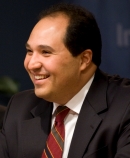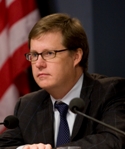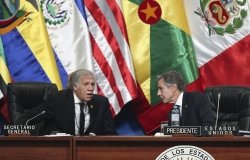Report Launch of <i>The United States and Mexico: Towards a Strategic Partnership</i>
Ambassador Jeffrey Davidow, president, Institute of the Americas, and former Assistant Secretary of State, and former U.S. Ambassador to Mexico; Governor Lázaro Cárdenas Batel, Public Policy Scholar, Woodrow Wilson Center, and former Governor of Michoacán, Mexico; Dr. Denise Dresser, professor, Instituto Tecnológico Autónomo de México and columnist, Reforma and Processo; Andres Martinez, Bernard L. Schwartz Fellows Program, New America Foundation and former Editorial Page Editor, The Los Angeles Times; Ginger Thompson, National Correspondent and former Mexico City Bureau Chief, The New York Times
Overview
The United States and Mexico could benefit from thinking more strategically about their relationship with each other, agreed panelists in the February 6 launch of the Wilson Center's new policy report, The United States and Mexico: Towards a Strategic Partnership. The report argues that the effective resolution of the common challenges facing both countries stands on greater collaboration, cooperation, and dialogue. The report's conclusions, generated from a series of interdisciplinary Working Group meetings held in fall 2008, offers sets of unilateral and bilateral policy considerations aimed at mitigating organized crime violence, updating the trade relationship amid continuing globalization, finding common ground on migration, and establishing effective mechanisms to jointly manage the borderlands.

Arturo Sarukhan, Ambassador of Mexico to the United States, lauded the report as an effective blueprint for the construction of a strategic partnership between the two countries. He noted that the report suggests a new paradigm for the relationship, providing a strategic focus that had been missing since the consensus that enabled the passage of the North American Free Trade Agreement (NAFTA) in 1993. This report "dares to be bold, to suggest what is feasible," the Mexican ambassador said, congratulating the report authors on blending both bilateral and unilateral policy considerations.

The Institute of the Americas's president, Jeffrey Davidow, lauded the report as "full of commonsensical, realistic suggestions," focused on the "doable." He diagnosed the current state of the U.S.-Mexico relationship as "stuck in the mud" with many of its component parts suffering in dysfunction. Yet he acknowledged that the 2008 Mérida Initiative, a binational partnership to fight drug violence and enhance the rule of law in Mexico, represents an important exception. Davidow said that the U.S.-Mexico relationship is "broken" in its most critical areas: NAFTA is providing diminishing returns financially, the North American Development Bank is "moribund and ineffective," and the U.S. immigration system is dysfunctional. The border, the site for the movement of massive amounts of goods and people, is also mismanaged.


The panel was moderated by Ginger Thompson, national correspondent and former bureau chief, The New York Times.
Documents & Downloads
- Report Launch of <i>The United States and Mexico: Towards a Strategic Partnership</i>Download
- Report Launch of <i>The United States and Mexico: Towards a Strategic Partnership</i>Download
- Report Launch of <i>The United States and Mexico: Towards a Strategic Partnership</i>Download
- Report Launch of <i>The United States and Mexico: Towards a Strategic Partnership</i>Download
- Report Launch of <i>The United States and Mexico: Towards a Strategic Partnership</i>Download
- Report Launch of <i>The United States and Mexico: Towards a Strategic Partnership</i>Download
- Report Launch of <i>The United States and Mexico: Towards a Strategic Partnership</i>Download
- Report Launch of <i>The United States and Mexico: Towards a Strategic Partnership</i>Download
- Report Launch of <i>The United States and Mexico: Towards a Strategic Partnership</i>Download
- Report Launch of <i>The United States and Mexico: Towards a Strategic Partnership</i>Download
Hosted By

Mexico Institute
The Mexico Institute seeks to improve understanding, communication, and cooperation between Mexico and the United States by promoting original research, encouraging public discussion, and proposing policy options for enhancing the bilateral relationship. A binational Advisory Board, chaired by Luis Téllez and Earl Anthony Wayne, oversees the work of the Mexico Institute. Read more
Thank you for your interest in this event. Please send any feedback or questions to our Events staff.










